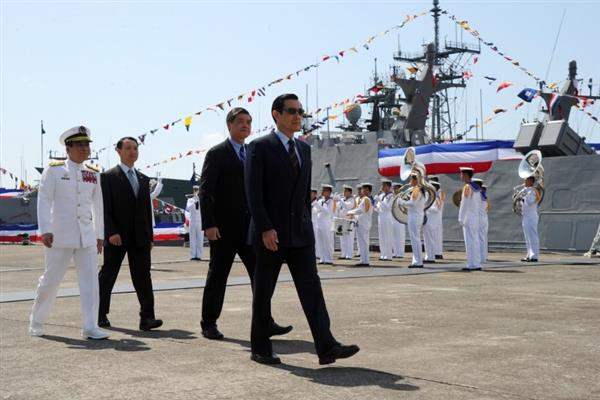News & activities
 News releases
News releases
President Ma Ying-jeou visited the ROC Navy's Zhongzheng Base in Suao Township of Yilan County on the morning of April 7 to observe the Hai Jui No. 10 Exercise. The president also presided over a ceremony inaugurating the Kuang Hua VI-class No. 81 and 82 vessels and new military equipment for the Hai Chiao No. 1 squadron. This marked the completion of the commissioning training and the replacement of military equipment in the navy. The president commended the soldiers on their hard work.
The president stated that the Kuang Hua VI-class missile ships were developed, designed, and built locally and represent a new generation of missile boat. The Kuang Hua VI series is an important indicator of the nation's autonomy in defense and ability to manufacture warships on its own, he said, adding that coordination among Taiwan's industrial, academic, and military communities has paved the way for 10 deliveries of a total of 20 such vessels to date, which effectively enhances the ROC's ability to maintain control of its seas.
The president pointed out that the Kuang Hua VI-class missile ships are meant to carry out littoral attack operations. They feature a stealth design, can be deployed very flexibly, and have the ability to launch long-range precision strikes. The vessels constitute an important tool for the military in asymmetric warfare, he said.
President Ma also expressed his respect and appreciation to senior navy officials who years ago were involved at many different levels of the effort to build up our war readiness. At the same time, the president praised the former director of the Navy's Vessel Control Room, General Lei Hsueh-ming, and his colleagues for making every effort to build a new naval force, which helped to set the model for projects to build new vessels and for contract management. This enabled subsequent vessel building projects to be carried out smoothly, he said.
The president then made remarks on three important concepts: ongoing work to establish military preparedness; establishing an ability to engage in asymmetric warfare; and training of military personnel. With regard to military preparedness, the president affirmed that the government's efforts to improve cross-strait relations have brought incipient signs of peace in the Taiwan Strait. This is in contrast to the Korean Peninsula, which is still clouded by the threat of war. Nonetheless, the people of Taiwan absolutely cannot forget that the other side of the Taiwan Strait constitutes the biggest threat to our nation's security. He remarked that the military must "avoid war without fearing it, and prepare for war without seeking it," and urged the armed forces to "rely not on the enemy not coming, but on your own preparedness," adding that we must pragmatically build up our military capabilities.
In terms of establishing an ability to engage in asymmetric warfare, the president took the stance that it is impossible for Taiwan to engage in an arms race with mainland China. Consequently, Taiwan must embrace a pragmatic attitude and have a military force that is strong, specialized, and skillful in order to realize the strategy of "resolute defense and effective deterrence." Consequently, the objectives of the national military are to be able to engage in asymmetric warfare and to utilize innovative tactics. The Kuang Hua VI-class missile ships, which are replacing the Hai Ou-class fast-attack craft, are low-cost but highly effective armaments. They are advanced in terms of speed, cruising radius, and combat power, he said, adding that they are an example of "less is more." Lastly, in regard to strengthening training, the president stated that people have unlimited potential. Practice makes perfect, he remarked, adding that the military must continue to undergo strict training to be able to adapt to all sorts of difficult environments. Besides training and boosting the stamina of soldiers, understanding all the different types of equipment is crucial. Therefore, all types of equipment should be used in the course of training, so long as this does not impact military preparedness, he said. This will enable the military to effectively utilize this equipment if needed.
President Ma stressed that the military must "adopt the most adverse assumptions" and "strive for the best and the strongest" in its efforts to boost the nation's ability to defend itself, thereby achieving a resolute defense. Without defense the nation does not enjoy security, and the public will be unable to live and work in peace, the president remarked. For almost three years now, he said, the military at all levels has spared no effort in order to achieve this objective. As long as one does not fear failure and is willing to give it his or her all, one will reap rewards, he commented.



